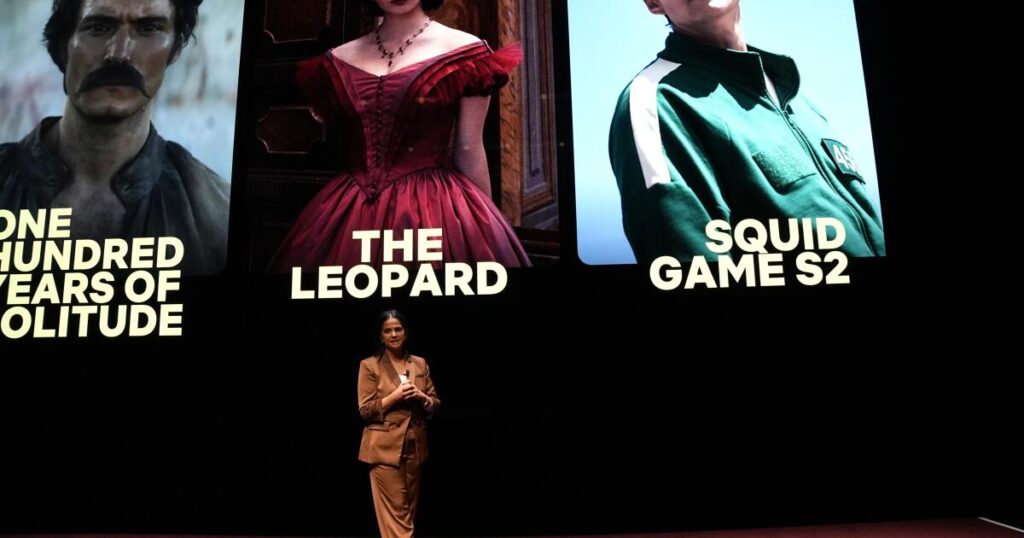[ad_1]
Is Netflix a universal language?
The entertainment giant is counting on it as the company seeks to extend its lead in the global streaming business. On Monday, Netflix showcased its latest slate of international original programs, which are a key part of its strategy to attract and retain subscribers around the world.
The list includes the much anticipated sequel to the violent Korean-language drama “Squid Game,” Netflix’s most watched show ever; “The Leopard,” an Italian story about a prince in the 1860s; and the third season of the Japanese series “Alice in Borderland.” Another ambitious project: the first-ever TV adaptation of the classic novel “One Hundred Years of Solitude.”
The Los Gatos, Calif.-based streamer’s strategy is to create local-language shows and movies that appeal to audiences in specific individual markets and regions. If those programs blow up in popularity, Netflix can use its platform to book them in other countries including the U.S., which is what happened with the first “Squid Game” season and the Spanish-language thriller “Money Heist.”
International markets are an important source of the company’s subscriber and revenue growth. Netflix estimates that two-thirds of its audience of 650 million people live outside the U.S.
“We’re working with local talent to make shows and films that people in specific countries will love,” said Netflix Chief Content Officer Bela Bajaria at a presentation at Tudum Theater in Hollywood on Monday. “And we’re proving that great stories can come from anywhere and be loved by audiences everywhere.”
Audiences on Netflix have embraced international programming as viewers have become increasingly accustomed to reading subtitles at home. More than 70% of all viewing on Netflix happens with subtitles or dubbing, Bajaria said. Last year, about 13% of hours viewed in the U.S. were for non-English titles.
Bajaria said some people assume that the main goal is to create global hits, but that’s usually not the way at Netflix, which is to make shows and films that resonate in their home countries first.
The reason many of its shows work is that audiences appreciate the authenticity of local storytelling. “[W]hen you try to make something that appeals to everyone, you just end up making something that appeals to no one,” she said.
The company has a significant presence abroad, with 26 offices outside the U.S., working with more than 1,000 producers from more than 50 countries. Non-English titles that draw the biggest U.S. audiences are Korean, Japanese and Spanish stories, Bajaria said.
The prime example of the strategy working is “Squid Game,” which captured 265.2 million views in its first 91 days on Netflix, according to company data. The series’ second season comes out on Dec. 26.
Will viewership for the second season reach the heights of the original?
Minyoung Kim, Netflix’s vice president of content for Asia Pacific, was reluctant to speculate but noted that Netflix’s number of subscribers has grown since “Squid Game” came out in 2021 and that the next season is packed with drama.
“I have a lot of confidence that our members who watched Season 1 will definitely love Season 2 and those who actually have not been introduced will find Season 2 will also resonate with them as well,” Kim said in an interview.
Netflix executives say their commitment to telling authentic local stories has helped them gain the trust of creators. Next month, Netflix will release Part 1 of “One Hundred Years of Solitude,” based on the sprawling magical realism novel by Gabriel García Márquez about the rise and fall of a fictional town in Colombia.
Francisco Ramos, vice president of Latin American content, said in a presentation video that previously no one had ever tried to adapt the book into a series or film, nor had the García Márquez family approved any adaptations.
“But we were able to, thanks to our commitment with the family to film in Colombia, in a series format to honor the original structure of the book, and in Spanish for authenticity,” Ramos said.
[ad_2]
Source link

